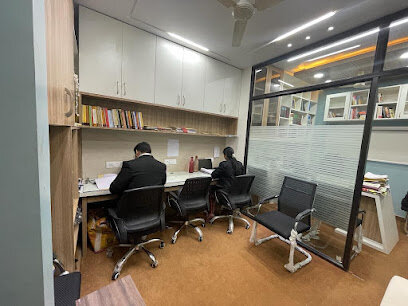Best Foreclosure Lawyers in Jaipur
Share your needs with us, get contacted by law firms.
Free. Takes 2 min.
Free Guide to Hiring a Real Estate Lawyer
List of the best lawyers in Jaipur, India
About Foreclosure Law in Jaipur, India
Foreclosure law in Jaipur, India, deals with the legal processes and regulations involved when a lender seeks to recover the balance of a loan from a borrower who has stopped making payments. The basic premise of foreclosure is that the lender can take possession of and sell the property used as collateral to repay the loan. Typically, foreclosure processes are guided by the provisions outlined in the SARFAESI Act (Securitisation and Reconstruction of Financial Assets and Enforcement of Security Interest) and other relevant local regulations.
Why You May Need a Lawyer
Several scenarios may necessitate seeking legal advice regarding foreclosure:
- You are facing foreclosure due to missed mortgage payments and need advice on your rights and options.
- You wish to contest a foreclosure notice that you believe has been incorrectly issued.
- You want to understand the legal process of foreclosure and how it will affect your financial and personal situation.
- You need help negotiating with the lender to possibly restructure the loan or find alternatives to foreclosure, such as a short sale.
- You are a lender seeking to ensure the foreclosure process is carried out legally and effectively.
Local Laws Overview
In Jaipur, as in other parts of India, the primary legislation governing foreclosure is the SARFAESI Act, 2002. This Act allows banks and financial institutions to auction residential and commercial properties when borrowers fail to repay their loans. Key aspects include:
- The lender must issue a notice to the borrower under Section 13(2) of the SARFAESI Act, giving them 60 days to clear the dues.
- If the borrower does not fulfill the obligation within the notice period, the lender can proceed with taking possession of the property under Section 13(4).
- The borrower has an option to appeal to the Debt Recovery Tribunal (DRT) or the Appellate Tribunal, challenging the move.
- Court proceedings, typically through civil suits, may also play a role in some foreclosure scenarios.
Frequently Asked Questions
What is foreclosure?
Foreclosure is a legal process by which a lender takes control of a property due to the borrower's failure to keep up with mortgage payments.
What steps are involved in the foreclosure process in Jaipur?
The process usually begins with a notice under Section 13(2) of the SARFAESI Act, followed by taking possession under Section 13(4) if dues are not cleared.
Can I stop foreclosure once it has started?
Yes, you can stop foreclosure by paying off your dues within the notice period or negotiating a settlement with the lender.
Can the lender sell my property without informing me?
No, the lender is legally obligated to inform you and provide sufficient notice before proceeding with the sale.
What are my legal rights during foreclosure?
Your rights include receiving proper notice, the right to appeal through DRT, and the possibility to contest the foreclosure through legal means.
Can I appeal against a foreclosure notice?
Yes, you can appeal to the Debt Recovery Tribunal (DRT) within 45 days of receiving the notice.
What happens if the sale of the property does not cover the outstanding loan amount?
The lender may take legal action to recover the remaining balance from you.
How long does the foreclosure process take?
The duration can vary depending on the specific circumstances but usually takes several months from the issuance of the notice to the sale of the property.
Can I get legal aid for foreclosure issues?
Yes, several organizations and legal aid societies can offer assistance based on your financial status and specific situation.
What if my lender is not following legal procedures during foreclosure?
If you suspect any malpractices, you can file a complaint with the relevant authorities or seek judicial intervention.
Additional Resources
For further information or assistance, you may contact the following resources:
- Debt Recovery Tribunal (DRT): Handles appeals against foreclosure notices.
- Legal Services Authorities: Offer legal aid for qualifying individuals.
- SARFAESI Act literature: Understanding your rights and obligations under the law.
- Consumer Court: For grievances against unfair practices by lenders.
Next Steps
If you need legal assistance regarding foreclosure, consider the following steps:
- Consult with a specialized foreclosure lawyer to understand your situation better.
- Gather all relevant documentation related to your mortgage and any communication with your lender.
- Discuss possible alternatives to foreclosure, such as loan restructuring or a short sale, with your lawyer and lender.
- File the necessary appeals or legal documents promptly if you decide to contest the foreclosure.
Actively seek support from local legal aid organizations if you cannot afford private legal counsel.
Lawzana helps you find the best lawyers and law firms in Jaipur through a curated and pre-screened list of qualified legal professionals. Our platform offers rankings and detailed profiles of attorneys and law firms, allowing you to compare based on practice areas, including Foreclosure, experience, and client feedback.
Each profile includes a description of the firm's areas of practice, client reviews, team members and partners, year of establishment, spoken languages, office locations, contact information, social media presence, and any published articles or resources. Most firms on our platform speak English and are experienced in both local and international legal matters.
Get a quote from top-rated law firms in Jaipur, India — quickly, securely, and without unnecessary hassle.
Disclaimer:
The information provided on this page is for general informational purposes only and does not constitute legal advice. While we strive to ensure the accuracy and relevance of the content, legal information may change over time, and interpretations of the law can vary. You should always consult with a qualified legal professional for advice specific to your situation.
We disclaim all liability for actions taken or not taken based on the content of this page. If you believe any information is incorrect or outdated, please contact us, and we will review and update it where appropriate.














